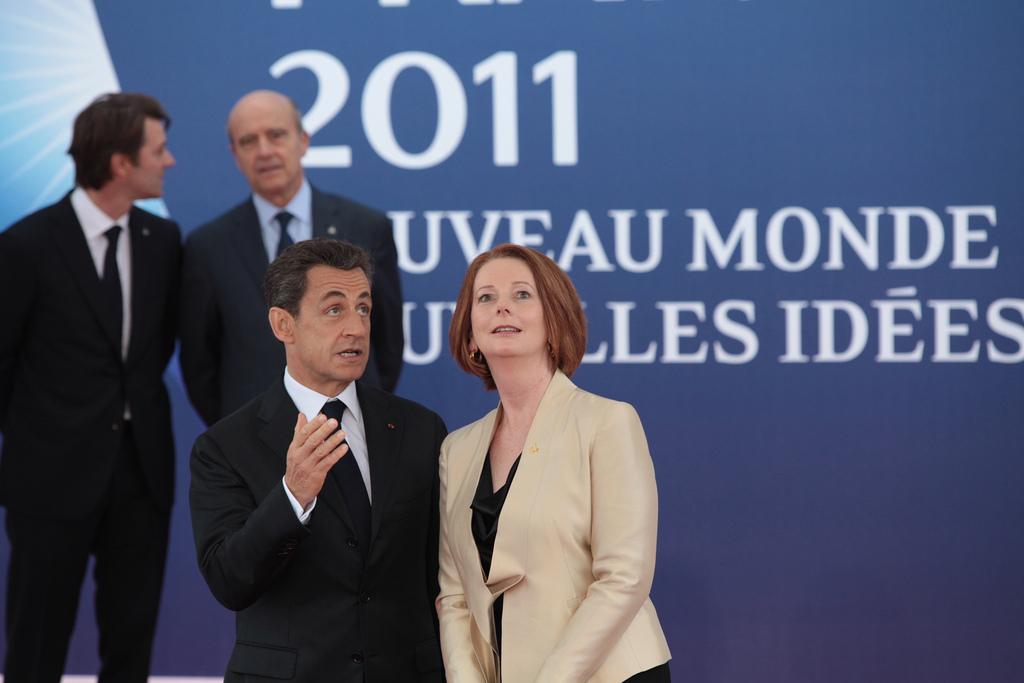Julia Gillard’s foreign policy – part 2
Posted By Graeme Dobell on August 7, 2013 @ 14:34
 [1]Julia Gillard defined herself early on in her leadership with the remark that foreign policy wasn’t her passion [2]. A self-deprecating sense of humour isn’t always a political asset in a leader and this was the line of a new leader conscious of how much there was still to learn. Australians are more used to leaders with the sure sense of self which is captured in the observation by Clive James: ‘A dominant personality doesn’t have to believe in its own will. All it needs is the inability to recognise the existence of anybody else’s’. Australians have just embarked on an election contest where there will be no doubt about the will of the key contestants.
[1]Julia Gillard defined herself early on in her leadership with the remark that foreign policy wasn’t her passion [2]. A self-deprecating sense of humour isn’t always a political asset in a leader and this was the line of a new leader conscious of how much there was still to learn. Australians are more used to leaders with the sure sense of self which is captured in the observation by Clive James: ‘A dominant personality doesn’t have to believe in its own will. All it needs is the inability to recognise the existence of anybody else’s’. Australians have just embarked on an election contest where there will be no doubt about the will of the key contestants.
As the previous column [3] argued, Gillard wasn’t alone, as a new Prime Minister, in being conscious of how much she had to discover about the conduct of foreign policy. Indeed, my argument is that as a first termer Gillard stood ahead of Rudd on foreign policy in a few key areas and edged out the first term efforts of Hawke and Howard.
Gillard’s international inexperience was on damaging display in the early weeks of her leadership, particularly with her inept reaching out to East Timor as a possible destination for resettlement of boat people [4]. The asylum seeker policy Gillard inherited from Rudd helped break her leadership; we are about to see whether Rudd and Abbott can offer new prescriptions on boat arrivals that can persuade within Australia and dissuade beyond the borders.
But after her early stumbles, Gillard’s diligence delivered steady foreign policy. It wasn’t brilliant but it was reliable. She had safe hands and applied herself with a lawyerly competence. The system she inherited greatly helped this steady sense of an evolving competence. Gillard benefited from the impressive array of multilateral memberships bequeathed by her predecessors. Any Australian Prime Minister now attends a set of summits that directly—even vividly—engage the nation’s interests: the East Asia Summit, the G20 summit and APEC. Add to this list the older regional summit in which Australia is the central power—the Pacific Islands Forum. This is the jet-powered version of on-the-job training: a set of leader clubs offering multiple benefits, personal and policy as well as political.
Gillard’s experience hosting the Commonwealth Heads of Government Meeting in Perth [5] would have highlighted for her the advantages that these new organisations offer Australia compared to the old Commonwealth club. A few decades back, an Australian PM could tend to the major bilateral relationships, occasionally get to the UN General Assembly and once every two years attend a Commonwealth Summit. It was an incomplete repast that didn’t reflect Australia’s regional interests and appetites.
The new structure created over the last 25 years—some of it achieved by considerable Australian effort—offers any leader a range of regional and multilateral opportunities that can also serve bilateral needs and personal understandings.
One lesson from the Gillard experience is that a lack of passion for foreign affairs is neither here nor there. The top job will impose the international dimension as a basic requirement. Add together bilateral events and the annual multilateral calendar and any Australian leader will have to devote six to eight weeks each year to the jet age version of personal summitry. Having a personal plane is a great help, but everything else is hard. The preparation is mountainous and there’s an ever-present chance of a slip when dancing around the summit. Kissinger’s barb is that nothing is more dangerous in diplomacy than two leaders getting together and thinking they can solve stuff with personal chemistry and a handshake—the stuff they think they’re solving is more likely to become a higher-order stuff-up.
Julia Gillard did well on the multilateral mountain. The final column will compare the Gillard and Rudd years.
Graeme Dobell is the ASPI journalist fellow. Image courtesy of Flickr user francediplomatie [6].
Article printed from The Strategist: https://aspistrategist.ru
URL to article: /julia-gillards-foreign-policy-part-2/
URLs in this post:
[1] Image: https://aspistrategist.ru/wp-content/uploads/2013/08/6308782381_edd628dfb7_b.jpg
[2] the remark that foreign policy wasn’t her passion: http://www.abc.net.au/news/2010-10-05/foreign-policy-not-my-thing-says-gillard/2286744
[3] previous column: https://aspistrategist.ru/julia-gillards-foreign-policy-part-1/
[4] reaching out to East Timor as a possible destination for resettlement of boat people: http://www.smh.com.au/national/timor-says-its-too-poor-to-do-australias-dirty-work-20100707-100pv.html
[5] hosting the Commonwealth Heads of Government Meeting in Perth: http://www.smh.com.au/national/gillard-wraps-up-overshadowed-chogm-20111030-1mq5x.html
[6] francediplomatie: http://www.flickr.com/photos/francediplomatie/6308782381/
Click here to print.